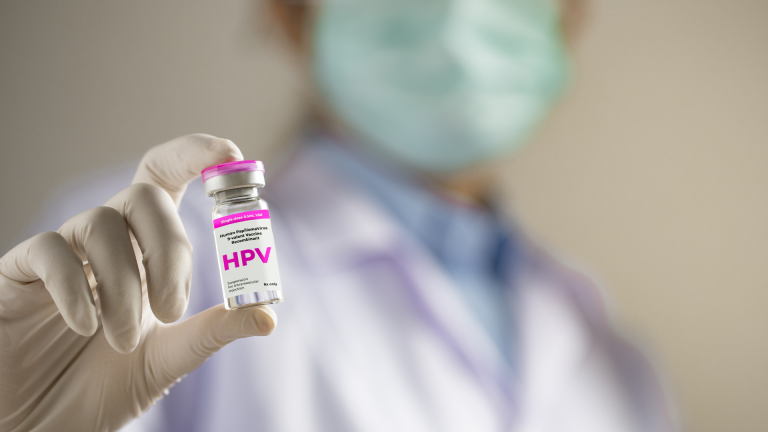- Home
- Cancer Treatment
Who Should Take HPV Vaccine For Cervical Cancer Prevention? What You Need To Know - CancerMitr
Recently, the union government made a significant announcement regarding the provision of free HPV vaccinations for all young girls aged between 9 and 14 years. The HPV vaccine serves as a preventive measure against the development of warts caused by the Human papillomavirus, which can manifest in the genital area and other regions of the skin, depending on the severity of the infection. It’s crucial to recognise that HPV stands as the primary cause of cervical cancer in women.
According to the Indian Council of Medical Research’s National Cancer Registry Programme (ICMR-NCRP), a staggering 3.4 lakh cervical cancer cases were reported in 2023 alone, constituting approximately 29% of all reported cancers among women in the country. Tamil Nadu has the highest number of women with cervical cancer amongst all Indian states. It is also important to note that less than 1% of women undergo an early screening process for the disease.
The World Health Organization (WHO) highlights that 90% of deaths attributed to cervical cancer occur in low- and middle-income nations. This underscores the urgency of addressing this issue and ensuring access to preventive healthcare measures.
Bookmark this article to delve deeper into the critical link between cervical cancer and HPV and to stay informed about who should take the HPV vaccination for cervical cancer prevention.
<span data-metadata=""><span data-buffer="">What is HPV?
HPV, known as Human Papillomavirus, comprises a group of 200 related viruses that induce the growth of warts on the skin or mucous membranes. Transmission of HPV commonly occurs through sexual intercourse (including peno-vaginal, peno-anal, and oral sex) but can also transpire via other forms of skin-to-skin contact between an infected and non-infected individual.
Warts triggered by HPV can manifest in various forms, including flat warts, plantar warts, common warts, periungual warts, and subungual warts. While not all HPV strains result in the formation of warts, certain strains deemed hazardous possess the potential to lead to cervical cancer. Understanding the diverse manifestations and risks associated with HPV underscores the importance of comprehensive preventive healthcare measures.
Also read: Pap Smear Test And Virginity: What You Need To Know
<span data-metadata=""><span data-buffer="">How is HPV diagnosed and treated?
HPV diagnosis typically involves DNA testing and the application of a solution test involving acetic acid. It’s crucial to understand that currently, there is no cure for HPV, and the body’s immune system plays a pivotal role in combating and managing the disease. However, medications such as salicylic acid and trichloroacetic acid are often prescribed to control warts and lesions.
In instances where genital warts are present, medical professionals may employ various treatment approaches, including cryotherapy, electrocautery, surgical excision, and laser surgery. These interventions aim to address the symptoms and minimize the impact of HPV, highlighting the importance of timely and comprehensive medical care in managing the condition.
<span data-metadata=""><span data-buffer="">How is HPV infection linked to cervical cancer?
The cervix, often referred to as the neck of the uterus, constitutes a critical component of the female reproductive system. Positioned between the uterus and the vagina, it serves as a narrow canal facilitating the passage of menstrual blood out of the uterus and allowing semen entry during copulation. Moreover, during childbirth, the cervix dilates to enable the safe passage of the baby from the uterus through the vagina.
Notably, the cervix is highly vulnerable to HPV, a sexually transmitted infection. Certain strains of HPV can start abnormal changes in the cellular structure of the cervix, a condition called cervical dysplasia. Without timely intervention, cervical dysplasia can progress into cervical cancer.
Cervical cancer, simply put, is a condition that is characterised by uncontrolled division of abnormal cells within the cervix, resulting in the formation of tumours that may metastasize to other regions of the body. Understanding the significance of regular screenings and early detection underscores the importance of proactive healthcare in safeguarding against the potential risks associated with cervical health.
<span data-metadata=""><span data-buffer="">Showing signs of cervical cancer? Click here to book a pap smear test.
<span data-metadata=""><span data-buffer="">Who should get the HPV vaccine?
It is important to recognize the correlation between HPV infection prevalence and an individual’s sexual activity. HPV infection, lacking a cure, often resolves spontaneously within the body, potentially leading to lifelong immunity against the specific strain of HPV.
In alignment with WHO guidelines, HPV vaccination is designed to shield against infection and is recommended for both boys and girls aged 9 to 14 years. To mitigate the emergence of cervical cancer to fewer than four cases per 100,000 individuals:
- It is important to administer HPV vaccination to all girls under 15 years old to curb cervical cancer prevalence.
- Moreover, to combat HPV transmission effectively, all children should receive two doses of the HPV vaccine, spaced 6 to 12 months apart, as per the guidelines of the US CDC.
- Girls aged 15 to 26 who missed the initial vaccination window may require three doses of the HPV vaccine. Additionally, individuals with compromised immune systems may necessitate an extra dose, as recommended by their healthcare providers.
- Dispelling the misconception that only virgins should receive vaccination is crucial. While it is typically advised for virgins, individuals who are not virgins can also benefit from vaccination, particularly those who remain unexposed or uninfected. Vaccination serves as a vital tool in interrupting the transmission chain of infection, offering protection against HPV-related diseases.

<span data-metadata=""><span data-buffer="">Who should not get HPV vaccines?
Individuals falling into the following categories are not advised to undergo HPV vaccinations:
- Pregnant women
- Those with a yeast allergy
- Individuals allergic to a HPV vaccine that they took earlier (they are recommended to skip the second and third dose unless advised differently by a medical expert)
Moreover, individuals aged 45 and above are typically not recommended for vaccination due to potential prior exposure to HPV. However, they are encouraged to seek guidance from their healthcare provider regarding the appropriateness of vaccination for their specific circumstances. Consulting a doctor ensures personalized recommendations tailored to individual health needs and considerations.
<span data-metadata=""><span data-buffer="">Think you need HPV vaccine?
CancerMitr provides patient counselling services including crucial steps to prevent cancer. Check out our website for more details.
<span data-metadata=""><span data-buffer="">What is a man's role in preventing cervical cancer?
In the context of cervical cancer, men serve as carriers of HPV and possess the power to disrupt its transmission by receiving vaccination. However, it’s important to note that they themselves may be susceptible to cancerous growths resulting from HPV infection.
Any region of the body exposed to HPV is vulnerable to dysplasia and malignant growths. Beyond cervical cancer, HPV can instigate cancers affecting the vaginal, vulvar, penile, prostate, anal, and oropharyngeal areas. Reports indicate that unhealthy oral sex practices have contributed to a surge in throat cancer cases, particularly observed in the UK and US.
This underscores the importance of comprehensive HPV vaccination strategies and promoting awareness about the risks associated with HPV transmission across genders. By addressing these concerns and adopting preventive measures, individuals can play an active role in reducing the burden of HPV-related cancers on both themselves and their communities.
<span data-metadata=""><span data-buffer="">Have you been suffering from an ulcer that has lasted for more than 15 days?
Book a test now!
<span data-metadata=""><span data-buffer="">Can virgins get an HPV infection?
In simple terms, yes, but delving into the definition of “virgin,” the answer becomes more complex.
Virginity is a social construct rather than a medical one, with its definition varying across cultures and regions. In many cultures, virginity is associated with peno-vaginal sex, while in others, any form of genital exposure to another individual may be perceived as compromising virginity. It depends on how “virginity” itself is defined by an individual or a community.
HPV is commonly known as a sexually transmitted infection, encompassing a spectrum of 200 virus types. Out of over 200 strains, approximately 40 types of HPV are sexually transmitted, meaning exposure of an individual’s vulva, vagina, cervix, rectum, anus, penis, scrotum, or even the mouth and throat regions to the virus can lead to infection. However, mere contact with an infected individual’s genitals using bare hands exposes an individual to the virus unless they effectively sterilize their hands.
Ultimately, avoiding direct physical contact with an infected individual offers the best defense against HPV transmission, assuming one has not received the HPV vaccine. Understanding these dynamics is crucial for individuals to make informed decisions about their sexual health.
How to avoid HPV infection?
People should follow these steps;
- Obtain HPV vaccination prior to engaging in sexual activity.
- Individuals who have not received the HPV vaccine should prioritize the use of protective measures such as condoms or vaginal caps, even during oral sexual activities.
- Foster monogamous relationships to mitigate the risk of exposure to the virus.
- Women are advised to undergo regular HPV tests or pap smear tests to facilitate early detection of cervical dysplasia. Pap tests are recommended every three years for women up to age 29, while HPV testing is recommended every five years starting at age 30.
- Men who have undergone circumcision are at an increased risk of contracting cancer-causing HPV. Circumcision is often performed for various health and hygiene reasons. Consequently, individuals in this category should exercise additional caution, including the use of protection during sexual encounters. Moreover, circumcised men should consider receiving the HPV vaccine, depending on their lifestyle factors.
In conclusion,
The treatment protocol for cervical cancer typically encompasses chemotherapy and radiation therapy. In advanced stages, healthcare providers may advise the surgical removal of the entire female reproductive system, including the ovaries.
HPV vaccines serve as a pivotal tool in disrupting the transmission chain of the virus and have the potential to save countless lives in the years ahead. It is imperative for individuals to actively collaborate with both the World Health Organization (WHO) and the Indian government in supporting this vital initiative. By joining forces, we can collectively combat cervical cancer and strive towards a healthier future for all.

